Amir Mir in Islamabad
Rediff.com's Amir Mir analyses the controversial developments post the explosive Memogate scandal that rocked Pakistan and reveals President Asif Ali Zardari's resolve to take on forces that are out to topple him
In a dangerous development threatening the democratic dispensation in Pakistan, the country's all-powerful military and intelligence establishment and the frail political leadership finally stand eyeball to eyeball in the Supreme Court, which has begun hearing the Memogate scam from December 19 despite objections raised by the government that the Apex court should not have taken up the case when the matter was already being probed by the Parliament.
The Memogate scandal revolves around an alleged memorandum addressed to former US Army Chief Admiral Michael Mullen and seeking the help of the Obama administration (in the wake of the May 2 killing of Al Qaeda leader Osama bin Laden in a covert US Navy Seals raid) to ward off a possible military takeover in Pakistan.
American-Pakistani businessman Mansoor Ijaz alleged that former Pakistan Ambassador to the United States Husain Haqqani had asked him to deliver the confidential memo, seeking US assistance against the aggressive designs of the Pakistan Army.
...
Zardari snubs Kayani's call, ready to fight till the last bullet
Image: Husain HaqqaniMansoor further alleged that the memo was drafted by Haqqani at the behest of President Asif Zardari and was delivered to Admiral Mike Mullen through former US national security adviser, General (retd) James Jones after the Abbottabad raid.
The issue was subsequently taken up by Army Chief General Ashfaq Pervez Kayani with President Zardari, asking him to summon Husain Haqqani back to Pakistan and initiate an inquiry against him.
Haqqani finally resigned following a November 22 high-level meeting of the civil-military top brass that included President Zardari, Prime Minister Gilani, Army Chief Kayani, ISI chief Lt Gen Pasha and Husain Haqqani.
The government subsequently referred the Memogate scam to the Parliamentary Committee of the National Assembly on National Security for a thorough inquiry. The committee was created by Prime Minister Yousuf Raza Gilani after the approval of a resolution in the joint session of the two Houses of Parliament and with the consent of all the ruling and opposition parties.
...
Zardari snubs Kayani's call, ready to fight till the last bullet
Image: Nawaz SharifHowever, even before the committee could formally kick off its work, opposition leader and former Prime Minister Nawaz Sharif approached the Supreme Court, alleging that the memo was approved by the country's top political leadership and that the court should conduct an inquiry to fix responsibility.
In an unusual move, Sharif himself presented his case by reading out the entire petition in the Apex court, seeking action under Article 6 of the Constitution against key government personalities, in case the issuance of the memo is established.
A nine-judge larger bench headed by Chief Justice Iftikhar Chaudhry subsequently passed the order on December 1 at the end of the proceedings without much deliberation. The immediate affectee of the court order was obviously Hussain Haqqani who was barred from leaving the country without the prior permission of the court.
In its written ruling on the Memogate case, the Supreme Court observed: "We are conscious of the fact that the respondents, who include the President of Pakistan, the Army Chief, the ISI chief, etc, have to file their replies to explain their position. However, we may, at this stage, refer to the case of United States vs Richard M Nixon, President of the United States [418 US 683] wherein the then US President was facing proceedings before the Committee of the Senate, and at the same time, pre-trial evidence was being collected by a special prosecutor general, which was objected to by him and the matter went up to the US Supreme Court and ultimately it was resolved that such pre-trial evidence could be collected."
...
Zardari snubs Kayani's call, ready to fight till the last bullet
However, while the Federation, General Kayani, Lt Gen Pasha, Hussain Haqqani and Mansoor Ijaz have submitted their replies with the Apex court, President Zardari decided to abstain, probably because of the presidential immunity he enjoys under the Constitution.
Well-placed law ministry officials in Islamabad are amazed at the court's decision to also issue a notice to the President on Sharif's petition as they point out that under Article 248(2) of the Constitution, no criminal proceedings whatsoever can be instituted against the President of the country during his five-year term of office.
They point out that the only action that could be taken against the President is under Article 47 of the Constitution, which provides for impeachment. But the President could only be impeached by Parliament in order to pave the way for initiating criminal proceedings against him.
As the chief justice apparently thinks otherwise on the issue, he has already asked the attorney general of Pakistan to submit the reply of the President on the Memogate scam or the court would be bound to believe that he has confessed to his alleged involvement in the case.
...
Zardari snubs Kayani's call, ready to fight till the last bullet
Image: File photo of Army chief Kayani with ISI chief Shuja PashaWhat is bound to kick up a storm in the coming days and weeks is the complete difference of views between the government's response filed with the court and those of the Army and the ISI chiefs.
While General Kayani and Lt Gen Pasha have not only acknowledged the memo and described it a threat to the national security, the federal government has maintained that Sharif's petition, seeking court intervention in a case that has already been referred to a parliamentary committee, should simply be dismissed.
The government has also reiterated Haqqani's position that no one in the government and its bureaucracy was involved in preparing the memo sent to Admiral Mullen.
In its reply to the court, the federal government has also taken up the latest revelation made by Mansoor Ijaz in the British daily, The Independent, that before the unearthing of the Memogate scam, ISI chief had toured Arab states friendly to Pakistan, asking for their approval to evict President Zardari from the presidency.
...
Zardari snubs Kayani's call, ready to fight till the last bullet
Image: File photo shows Kayani chairing a meeting of top generalsIt is generally believed that all actions by the incumbent ISI chief are taken with the prior approval of the Army chief. The allegation led many parliamentarians to seek the ISI chief's resignation for his involvement in an anti-government plot, as had been the case with Haqqani who had to quit over allegations of involvement in an anti-military plot.
In fact, the ISI chief had offered his resignation on May 13 while appearing before a joint session of the Parliament along with General Kayani to explain their collective failure and deficiencies that came to light in the wake of the May 2 raid in Abbottabad, which killed Osama bin Laden.
But President Zardari, who at that time was under tremendous pressure from the Sharif-led Pakistan Muslim League to remove the ISI chief and the Army chief, decided to give another chance to the current khaki leaders, who are now trying to dislodge their benefactor.
Analysts say that the Pakistani military and intelligence leadership was trying to restore its wounded pride ever since the Abbottabad raid and the Haqqani episode came as a golden opportunity to re-establish its diminishing authority over the civilians who had dared to make them answerable before Parliament.
...
Zardari snubs Kayani's call, ready to fight till the last bullet
But the most shocking aspect of the ongoing drama is that a twice elected prime minister (Nawaz Sharif), who himself had been dislodged by his hand-picked Army Chief (Gen Pervez Musharraf) in 1999, has decided to become a co-conspirator with the military establishment in yet another plot to dislodge a democratically-elected government.
There are unofficial reports that Nawaz Sharif and Lt Gen Shuja Pasha had a one-on-one meeting in Istanbul in the last week of October wherein it was decided that the establishment and the opposition would work together to get rid of the corrupt Zardari government before the upcoming elections of the Senate in March 2012 (in which the PPP is set to win majority in the upper house of Parliament).
However, while Sharif's close circles deny any such meeting, saying that Sharif had conducted a week-long visit of Turkey on the invitation of the Turkish President Abdullah Gul and Prime Minister Recep Tayyip Erdogan, those in the intelligence circles vehemently deny that Ahmed Shuja Pasha had travelled to Turkey during those days to see Sharif.
...
Zardari snubs Kayani's call, ready to fight till the last bullet
Image: (Left Inset) Mansoor Ijaz (Right) Shuja PashaInterestingly, Army Chief General Ashfaq Kayani and ISI Chief Ahmed Shuja Pasha owe their current positions to President Zardari who had granted them unprecedented extensions upon expiry of their respective service tenures.
While Kayani was granted a second three-year term as the Army chief in July 2011, his right-hand ISI chief, Lt Gen Ahmad Shuja Pasha has already been given one-year extensions twice.
As his third one year tenure as the ISI boss is again coming to an end in March 2012, his close associates say Pasha is vying for yet another extension to give final touches to the future set up. The enormous interest Pasha had shown in taking up Memogate scam can be gauged from the fact that he had personally travelled to London last month to hold a one-on-one meeting with Mansoor Ijaz, which lasted for four hours.
...
Zardari snubs Kayani's call, ready to fight till the last bullet
Pasha had sought the meeting after the publication of Mansoor Ijaz's op-ed piece, 'Time to Take on Pakistan's Jehadist Spies', in the Financial Times on October 10.
According to Mansoor Ijaz, he delivered all the important documentation to Lt Gen Pasha about involvement of Ambassador Haqqani in the Memogate scam. Interestingly, Pasha travelled all the way from Islamabad to London to see an American national who has positioned himself as an enemy of the Pakistan Army and criticised the ISI for having patronised Islamic militants.
In his much-discussed Financial Times article, Mansoor Ijaz described the ISI in following words; 'Questions about the ISI's role in Pakistan have intensified in recent months. The finger of responsibility in many otherwise inexplicable attacks has often pointed to a shadowy outfit of ISI dubbed S-Wing, which is said to be dedicated to promoting the dubious agenda of a narrow group of nationalists who believe only they can protect Pakistan's territorial integrity.'
In the same article, Ijaz described situation dangerous for civilian rule and declared that Zardari was an easy target for an embarrassed military establishment after the May 2 [Abbottabad] raid. He wrote, 'General Ashfaq Kayani, the army chief, and his troops were demoralised by the embarrassing ease with which the US Special Forces had violated Pakistani sovereignty. Inter Services Intelligence, Pakistan's feared spy service, was charged by virtually the entire international community with complicity in hiding bin Laden for almost six years. Both camps were looking for a scapegoat; Zardari was their most convenient target.'
...
Zardari snubs Kayani's call, ready to fight till the last bullet
In fact, there are two pieces of evidence in the Memogate scam which have already been placed before the Supreme Court -- the first is against Haqqani (which has been investigated by the ISI chief and was found to be genuine by him) while the other is against the ISI chief himself which has not yet been investigated by the government.
But interestingly, both pieces of evidence have been provided by the same person -- Mansoor Ijaz. In the first case, the alleged culprit, Haqqani has already been compelled to resign, while in the second case, the accused, Lt Gen Ahmed Shuja Pasha is still in office, amidst calls by elected parliamentarians for his dismissal on charges of misconduct.
The Supreme Court has already been petitioned by Engineer Jameel, seeking directions foe the government to remove Lt Gen Pasha from the sensitive slot of the ISI chief.
In another key development in the Memogate scam, a key player, General (retd) James Logan Jones, former US national security adviser, and the man that handed the memo to the then-chief of US military, has said, in an affidavit to be filed in the Supreme Court on December 19, that Mansoor Ijaz not once mentioned the name of principal accused Haqqani in their conversations leading up to the sending of the communique.
James Jones has cast serious doubts on the veracity of Ijaz's claims that the memo had the backing of the 'highest authorities' in Pakistan. In fact, he has stressed that he had no reason to believe that Haqqani had anything to do with it, and that the document was probably not credible.
...
Zardari snubs Kayani's call, ready to fight till the last bullet
But while ignoring all these facts with impunity, Pakistan's military and intelligence establishment and the leadership of the key opposition party has apparently decided to exploit the Memogate scam to discredit the government and get rid of the president by trying to implicate him in the case.
It is significant to note that the Army and the ISI chiefs have demanded in their respective replies filed with the Apex court that it should investigate the facts and circumstances leading to conception and issuance of the memo.
While implicating Haqqani in Memogate, the khaki bosses have claimed in their replies that it was their pressure that led to his resignation. The two have maintained that the memo had affected the national security and it was an attempt to lower the morale of the military which should be thoroughly investigated.
Though Kayani and Pasha have refrained from directly implicating President Zardari in the scam (in their replies), there are clear indications to suggest that Sharif had approached the Apex court at their behest, mainly because they were not content with Haqqani's exit and the initiation of an inquiry into the Memogate by a parliamentary committee.
Rumours have it that Sharif had a clandestine one-on-one meeting with the chief justice of Pakistan at his Murree residence a few days before petitioning the Supreme Court. The Intelligence Bureau (IB), which works under the command of the civilian government, is learnt to have in its possession a video footage, showing the official car of the chief justice of Pakistan entering the Murree residence of Sharif and leaving the premises almost three hours later.
But judicial circles in Islamabad have strongly refuted these reports as a pack of lies aimed at tarnishing the image of the chief justice.
...
Zardari snubs Kayani's call, ready to fight till the last bullet
Image: Fil;e photo of Iftikhar Chaudhry with Nawaz SharifYet, the fact remains that both Iftikhar Chaudhry and Nawaz Sharif are considered close given the fact that it was Sharif who had launched an agitation against the Pakistan Peoples Party government for the restoration of the superior court judges, who had been sacked by General Pervez Musharraf during his last days in power.
All deposed judges, 100-plus, including the chief justice, were eventually reinstated in May 2009 by the present government, after Army Chief General Ashfaq Kayani had stepped in on behalf of the opposition.
For that reason, some key government ministers say by hurriedly admitting Nawaz Sharif's petition and instantly issuing notices to the President and the federation in a shabby manner at the very first hearing of the case and that too without even giving them a chance to present their view point, the Apex court has raised some important questions about the separation of powers, the supremacy of Parliament and the law itself.
The court had decided to accept Sharif's petition despite the fact that the main accused in the Memogate scam (Haqqani) had already returned to Pakistan, resigned from office and submitted himself before a parliamentary committee. The haste shown by the Apex court forced the President of the Supreme Court Bar Association Yasin Azad to publicly criticize superior judiciary for getting itself involved in pure political cases.
...
Zardari snubs Kayani's call, ready to fight till the last bullet
Addressing a news conference, he said political stakeholders should settle their issues in Parliament instead of taking purely political issues like the Memogate scam to the Apex court. The court decision prompted top government leaders, including two federal ministers and former law minister Babar Awan, to address a hard hitting press conference in federal capital and level serious allegations against the Apex court, including the one that it gave special treatment to Sharif by allowing his armed security guards to accompany him into the court room on December 1.
As the Supreme Court started hearing the Memogate scam on December 19, the chief justice took serious notice of these allegations. He told the attorney general of Pakistan (who was representing the federal government) that the Apex court orders of December 1 were ridiculed by the ministers during a press conference and he wants to know what disciplinary action the prime minister has so far taken against them.
Amid all these developments, the national political scenario seems as gloomy as ever with the ever-ambitious military establishment trying to get rid of President Zardari as early as possible and by whatever means. This is despite the fact that he was elected by both Houses of Parliament for a five-year constitutional tenure, which will expire in September 2013.
Some government insiders claim that while President Zardari was away in a Dubai hospital for medical treatment and speculations were rife about his physical condition, he was conveyed a clandestine message on behalf of General Kayani, suggesting him to consider resigning from his office on health grounds before the findings of the Memogate scam put further pressure on him. However, true to his reputation of a defiant politician, Zardari not only snubbed the resignation call but also decided to return to Pakistan immediately.
...
Zardari snubs Kayani's call, ready to fight till the last bullet
The beleaguered Pakistani President, who keeps automatic weapons on his bed side at his presidential suite now-a-days, told rediff.com on phone from Dubai on December 18 before travelling back to Pakistan after spending two weeks that he is not a coward but a fighter and escape will never be an option for him.
The president said: "Remember, I am the son in law of Zulfiqar Ali Bhutto Shaheed who had opted for death over principles. And don't forget that I am the spouse of Benazir Bhutto Shaheed who willingly laid down her life while struggling against the forces of dictatorship and extremism. I am fit and healthy now and returning home to carry forward the mission of the Bhuttos. I can't even think of abandoning my motherland, as had been the case with those who are trying to derail democracy by using underhand tactics. I was born in Pakistan and I will breathe my last in my homeland."
While refuting the likelihood of yet another martial law being imposed in Pakistan, the president said: "There is no room for any further adventurism in Jinnah's Pakistan. Each and every state institution should function within its laid down parameters. Things have changed, time has changed. Neither an elected president nor an elected prime minister can be forced to resign by anyone in today's Pakistan."
"Even otherwise, no court would approve the assumption of power by an authority not mentioned in the Constitution and any such move could invoke Article 6 of the Constitution which deals with high treason."
Asked about his line of action if an attempt is made to dismiss his government prematurely, the president said: "I am a follower of the late Bhuttos who had shown perseverance and loyalty to the people of Pakistan. I will fight till the last bullet and will prefer to die with my boots on. If I would have to pick between a life without principles and an honourable death, I would pick the latter because that is how I would like to be remembered in history."
Analysts say Zardari's return to the presidency has sent a strong and clear message to all his khaki as well as political foes that he is back in the saddle with a bang and ready to withstand whatever gale.
Click on NEXT to go further...

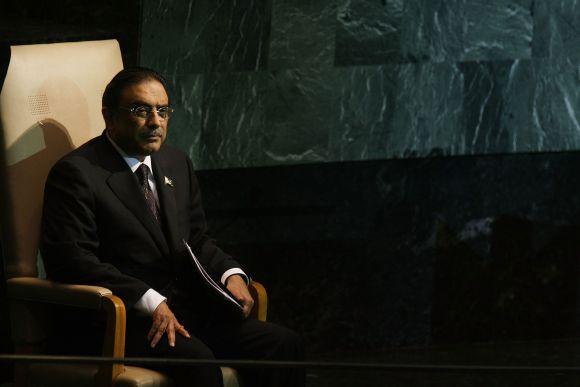
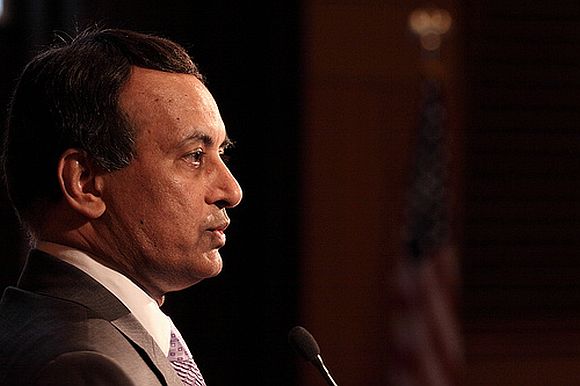
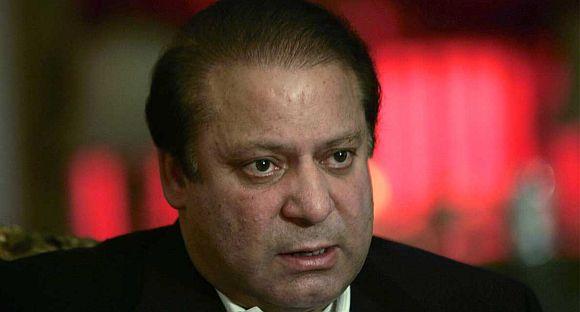

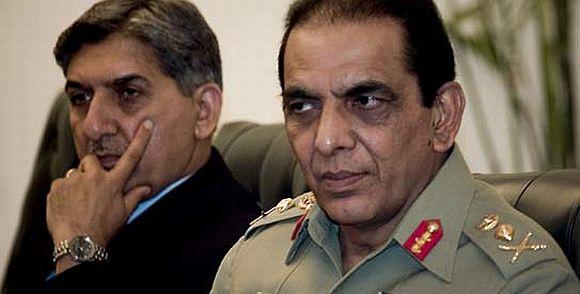

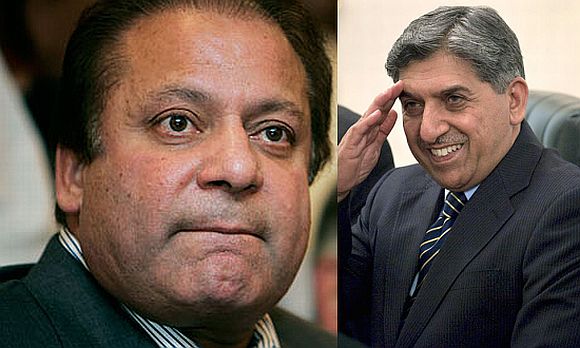
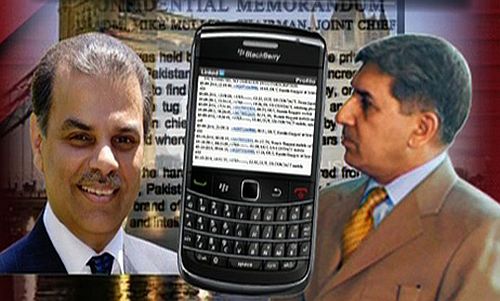
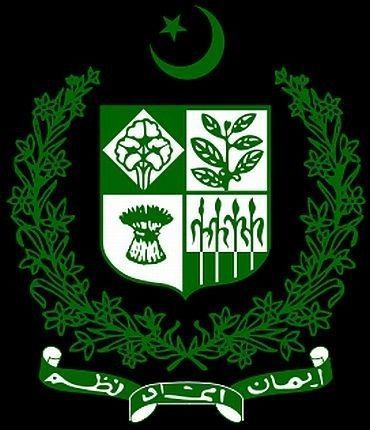
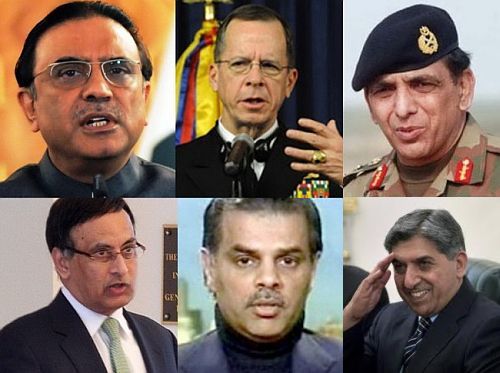
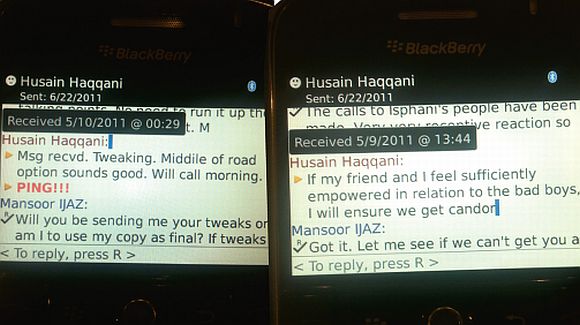

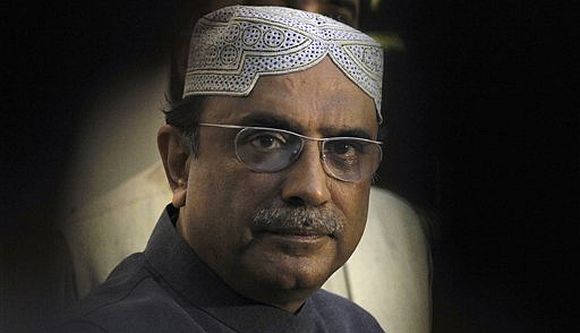
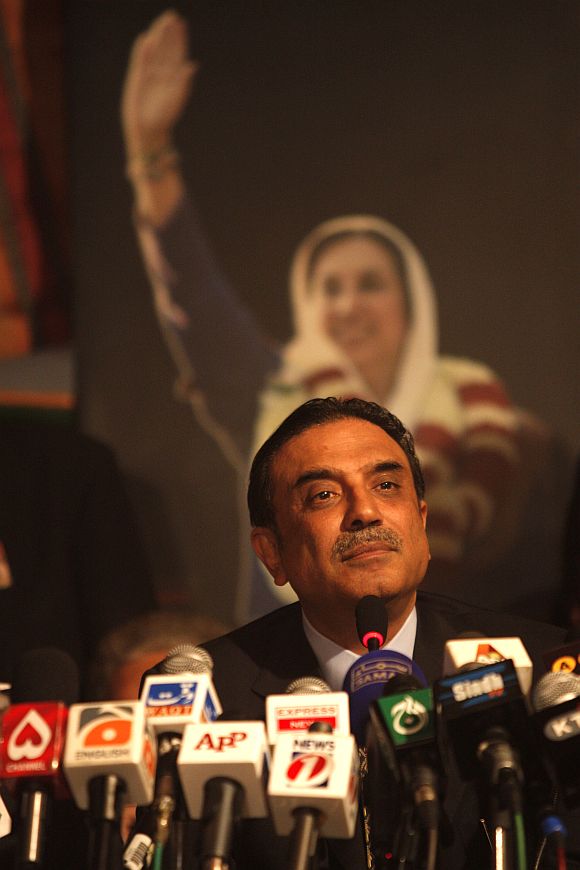
article